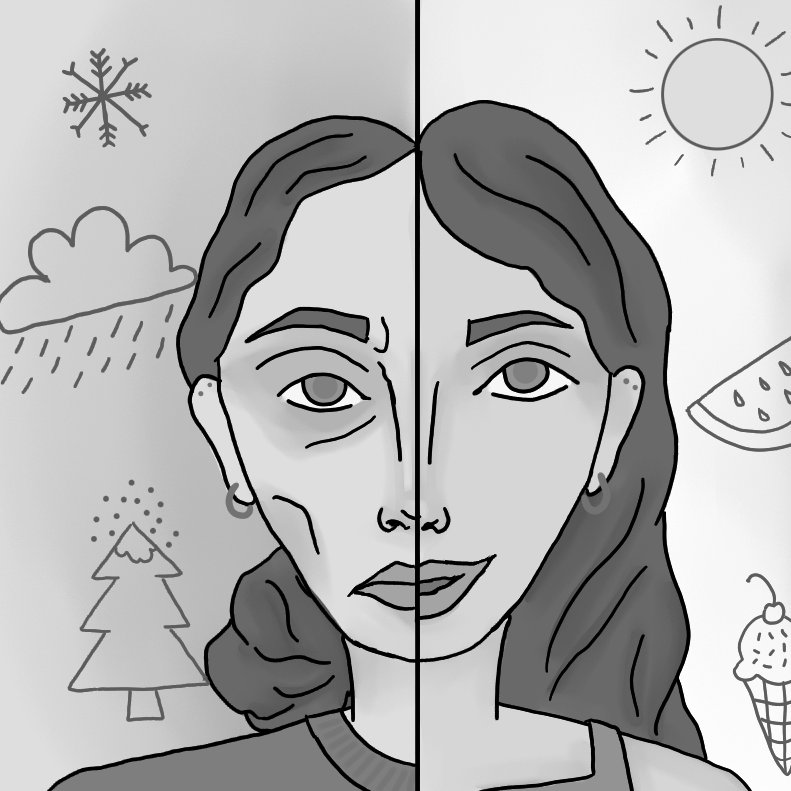As the weather gets colder and the trees become bare, many Americans experience mood shifts. Seasonal affective disorder, also known as seasonal depression affects roughly ten million Americans and is a type of depression that is caused by the change in seasons. While most may not be diagnosed with something as serious as seasonal depression, they may feel more sad during these colder months.
Symptoms of seasonal depression include loss of interest in activities one usually enjoys, moodiness, fatigue, feelings of hopelessness, change in appetite and sleep, and thoughts of suicide. The change in weather during the winter and autumn seasons has caused some SCHS students to encounter some negative emotions.
Senior Camille Ebueng feels the weather puts a damper on her mental health.
“It feels really gloomy and almost depressing,” Ebueng said. “It’s like the weather kind of weighs down on me a lot because of the cold… I just kind of go insane.”
With the sun setting at an earlier time and the weather getting chillier, Ebueng believes additional factors also contribute to one’s mood shifts. She feels that the copious amounts of schoolwork students are assigned in the winter may contribute to their sadness.
“When work is piling up and the weather is changing constantly, it feels like it’s just clashing together,” Ebueng said. “It’s one big factor that kind of ruins my motivation for school.”
During the sunnier months, senior Ivana Fonkwo spends time outdoors to release her negative emotions and help cope with them. In winter, she is no longer able to enjoy outside activities because of the gloomy weather. Similarly to Ebueng, Fonkwo feels that both stressors from school and the unideal weather affects her mood.
“It (her sadness) is a combination of the two because with finals, there’s obviously that stress and with the colder months, there’s fewer opportunities to relieve that stress, such as going outside or hanging out with friends,” Fonkwo said. “In the colder months, I’m less excited to go outside and go for walks to improve my mood like I usually would.”
As Fonkwo expressed, enjoying the outdoors may be hard with the winter and autumn seasons as they constantly welcome poor weather conditions. One way to combat sadness is visiting SCHS’s Wellness Center, which is used for students to access resources to help them during stressful times.
SCUSD social worker Leah Cohen believes that having someone to talk to can improve one’s mood exponentially. Cohen encourages the use of the wellness associates at SCHS to talk through one’s feelings because it is a powerful tool that can help one’s mental health.
“Sometimes that release of saying all the things that are bothering you or that are on your mind that day can make you feel lighter,” Cohen said.
Although the Wellness Center strives to welcome students with open arms, some SCHS students feel intimidated entering a new place. Fonkwo believes that the Wellness Center may be helpful if there was more accessibility to it.
“The Wellness Center is something we’re all aware of, but I feel there’s not a lot of direct outreach and resources made available to students,” Fonkwo said. “There’s some anxiety about asking teachers to go to the Wellness Center in the middle of class.”
If students are intimidated by the Wellness Center, there are other options to improve their mental health. SCHS offers a “Bring Change to Mind” club, which is about removing the stigma around mental illness. Attending clubs such as BC2M may offer a way to connect with others who may be going through a similar situation.
Cohen believes having a friend or a trusted individual to talk to can help with the distress students may be experiencing.
“Making sure that the student is connected and not isolated is a big factor in depression and making sure that they have the tools that they need to do things that make themselves feel better,” Cohen said.
In addition to campus clubs and social connections, SCHS faculty strive to help students’ mental health during the autumn and winter months. Wellness associate Lauri Macey encourages students to come to the Wellness Center if they are struggling with seasonal sadness.
“There are many resources for students feeling trapped and isolated this season,” Macey said. “We’re here for you. We really do have your best interest at heart, and we want things to go better for you.”
If you are concerned about yourself or a friend in need of professional support, reach out to:
- National Suicide Prevention Lifeline: 24/7 Call or Text 988
- Crisis Text Line: Text HOME to 741741


